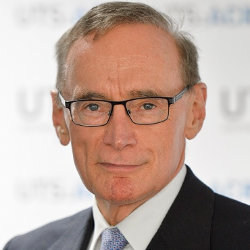BOB CARR. Chinese Australians are the silent minority on foreign policy (Australian Financial Review, 25.10.18)
October 25, 2018
Imagine the crucial byelection had not been in Wentworth but in another Sydney electorate, Barton. Instead of a 12 per cent Jewish population, it is one with a 34 per cent Chinese population. And imagine that, in the context of this byelection and after lobbying by the Chinese community, the federal government had announced it was considering a shift in Australia’s position on the South China Sea. Perhaps by way of an article in a Chinese language paper.
Imagine that the Prime Minister confirmed we would indeed now acknowledge on-the-ground realities in the region. In this spirit we would consider accepting progress in management of the maritime territorial disputes between the various states like China and the Philippines. As a result we would consider no longer insisting on the applicability of the UN Convention on the Law on the Sea.
Then imagine the howls of outrage triggered by this blatant attempt to secure electoral support to buy votes by dangling the prospect of a shift in an Australian diplomatic position.
Or imagine in 2013 Tamil voters telling Canberra they wanted Australia to join Canada and boycott the Commonwealth Heads of Government Meeting planned for Colombo as a symbolic statement against the policies of Sri Lanka. And imagine this happening during a byelection in a seat with a sizeable Tamil population. If the Australian government had announced it was considering shifting foreign policy in this context it would have been seen as an unforgivable warping of the nation’s diplomacy for a domestic agenda.
In a forthcoming report titled Australia Talks China, Professor James Laurenceson reviews the recent national conversation on China. UTS
These scenarios are exactly analogous with the announcement of the Morrison government, at the insistence of the Liberal candidate for Wentworth, Dave Sharma, that they were considering changing the location of the Australian embassy from Tel Aviv to Jerusalem and joining President Trump in his repudiation of the multinational nuclear deal with Iran.
Silent minority
But here’s the truth, and it undercuts that part of the recent China Panic that questioned the allegiance of Chinese Australians. Australians with Chinese heritage simply do not lobby on China’s national interest. This may appear a bold statement or a surprising fact. It is both but it’s also true. As a former politician I cannot recall a single delegation from a Chinese community organisation to a federal member of Parliament, or to the machine of either party, pressing for a shift in foreign policy. This would include on South China Sea, Taiwan or Tibet.
As foreign minister in 2012 I sat in a meeting with a dozen Labor MPs all holding electorates with sizeable Tamil populations. They put the case for Australia taking a harder line against the government of Sri Lanka. In the office of a western Sydney Labor MP I heard from leaders of the Vietnamese community who wanted Australia to push hard on human rights in Vietnam. I met representatives of Arab background Australians all Sunni about Australia’s position on the Syrian civil war.
Striking, therefore, that I cannot recall a Chinese community organisation coming to talk about Australian policy towards China striking, because the Chinese community is larger than any of these others (even after allowance for those with HK, Taiwanese or south-east Asian backgrounds).
In a forthcoming report titled Australia Talks China, my colleague Professor James Laurenceson reviews the recent national conversation on China. He looks at the evidenceavailable about Chinese community behaviour and matches it against some of the recent excitable fear-mongering about “the threat” posed by our Chinese migrants. The Australia-ChinaRelations Institutereport makes the point that, in all the agitation about Chinese influence in Australia, the only evidence of the Chinese community saying anything about the South China Sea was a single letter, a single meeting, and a single demonstration.
There were no delegations to MPs. Nor was there any of the systemic activity that other ethnic communities attempt Jews, Armenians, Turks, Macedonians, Greeks when something in the international arena threatens or galvanises them.
One academic argues, quoted in the ACRI report, that as a new community the Chinese-born are focused on jobs, housing, their children’sschooling. This experience would appear to contradict completely the somewhat McCarthyist argument that China-born Australians had a divided allegiance that, in the words of academic Clive Hamilton, they are ready to “take to the streets in support of Australia’s enemy, China”.
Even if they attempted to lobby, they would be doing nothing wrong. Chinese would be doing what Jews, Arabs, Tamils, Vietnamese, Turks, Armenians, Greeks and Macedonians routinely do. Our society is big enough to hear the debate and make a decision on whether what’s being advocated is in Australia’s interest.
There isnothing wrong with the Jewish community pushing on Jerusalem and Iran. It’s their right. Nor is there anything wrong in others firmly asserting that what they are urging is not in Australia’s interest as opposed to Israel’s. And Australians with a Chinese background would be within their rights to push a line on foreign policy. What stands out is their lack of interest in doing so.
Bob Carr, former NSW premier and Australian foreign minister, is director of the_Australia-China Relations Institute_at the University of Technology Sydney.
